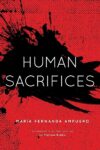
[Feminist Press; 2020]
Tr. from the Spanish by Frances Riddle
“Auction”, the powerful opening story of Ecuadorian writer María Fernanda Ampuero’s first collection Cockfight, describes the abduction of a young woman by a taxi driver in an unnamed Latin American city. Taken to an abandoned “garage that smelled like a rotting cockpit”, it slowly dawns on the blindfolded protagonist that she is being trafficked. As she listens to wealthy buyers bidding for the other hostages, who will be sold for their beauty and wealth, the protagonist concocts a plan:
When it’s my turn I think about the roosters. I close my eyes and open my sphincter. I know that this is the most important thing I will do in my life, so I do it right. I soak my legs, my feet, the floor. I’m in the centre of a room, surrounded by criminals, displayed before them like cattle, and like cattle I empty my bowels.
After this display, in which she defecates herself, screams like a madwoman — “I start to laugh, deranged, to laugh, and laugh, and laugh” — no one bids for her and she is abandoned, alive and free, on the side of a highway. Labelled a monster by the male auctioneer, the character liberates herself by converting the sexualized female body into a monstrous spectacle. The roosters, whose smell permeates the space where the hostages are held, trigger flashbacks to the protagonist’s childhood spent at cockfights with her father. Her initial fear of the dead animals was transformed after she realized the macho cockfighters, who surreptitiously tried to kiss and touch her, were also disgusted by their visceral remains after the fights: “before falling asleep I would stick a rooster head between my legs. . .Those macho guys didn’t like lifting up a skirt to find little severed heads.”
This potent image and the leitmotiv of the roosters, which gives this collection of thirteen stories its title, set the terrain for Ampuero’s unflinching literary explorations of gender-based violence, sexual and domestic abuse. The collection is prefigured by a quotation from the celebrated Brazilian writer Clarice Lispector — “Am I a monster or is this what it means to be human?” — and whilst in interviews Ampuero has rejected being simplistically grouped in a category of “women writers”, it is clear that her writing dialogues with a body of recent writing by Latin American women that explores dark themes from the underbelly of female experience. As El País explains, one key theme linking the work of writers such as Samantha Schweblin, Mariana Enriquez, Ariana Harwicz, Liliana Colanzi, Margarita García Robayo, and fellow Ecuadorian Mónica Ojeda, is how it “delves into the darkest and most desolate areas of human existence and the ugliness of the world around us.” Like her Latin American contemporaries, as well as prominent Latinx writers such as Carmen María Machado, Ampuero deploys the conventions of horror to deftly unpick and disturb both the spaces of the home and the family, with the aim of making visible oppressions of gender, race and class. As the other epigraph to the collection, a quotation from Argentinian writer Fabián Casas, states: “Everything that rots forms a family.”
The family and the space of the home are consistently depicted as rotten in Cockfight. In the coming-of-age story “Monsters”, the family maid warns the two young girls in her care, who are obsessed with demons, vampires and horror movies, that they should be “more afraid of the living than the dead.” As the girls begin adolescence and their fear of imaginary creatures is replaced by “faceless men”, “menstrual blood”, and “monstrous babies”, the story’s denouement reveals that the real threat lies in a society that permits violence against bodies gendered as female and that this violence occurs within the walls of the home itself. Fathers, brothers, and husbands are commonly the perpetrators of violence. “Other” depicts the grinding, daily psychological and emotional abuse of a violent marriage, while in “Mourning”, the collection’s most graphic story, a brother tortures and rapes his sister, making her a sex slave for the local community. However, women and the broader family, neighborhood and social structures are also shown to be complicit. “Griselda” cleverly narrates how a group of female neighbours turn a blind eye to the violent relationship between a mother and daughter; and “Blinds” depicts a mother’s sexual abuse of her son, disturbingly narrated from his perspective. “Ali” in particular is powerful in its portrayal of the legacy of child abuse, narrating the slow unravelling of a perfect, middle-class housewife under the weight of trauma. The horror of familial abuse and the continuity of violence are devastatingly exposed in the story’s final image, in which we are left with the gaze of Ali’s daughter, who is described as having the same “frightened blue eyes” as her mother.
Many of the stories end like this, with a condensed image that demonstrates Ampuero’s skill as a writer and her awareness that violence needs no unnecessary flourishes. “Coco”, for example, jolts the reader with its final image: “The light snaps back on like a guillotine. On the surface of the water, her arms and legs spread open, Verónica’s body floats adrift.” Critics have called Ampuero’s prose sparse, sharp and blunt and in English translation, Frances Riddle — who has carved out a career translating many of the most innovative new Latin American writers — expertly conveys Ampuero’s unadorned style in an idiomatic language that is place-less as well as Latin American. References to global brands and a mass media dominated by US culture are peppered with Spanish proper nouns and hints at themes of exile and migration, as well as subtle critiques of the economic and structural reasons behind this. Thus, in “Blinds” the child narrator refers to relatives “who one day went off to war or to the United States, emigrated and never returned”, while in “Other”, the housewife queuing in the supermarket ironically comments: “For a country that’s going bankrupt, it’s nice people can still buy three kinds of American cereal.”
The preciseness of the language and the concision of the stories, the majority of which are under ten pages long, means that the collection is never weighed down by the darkness of its subject-matter, remaining focused on the acuteness of its social commentary. Ampuero also makes interesting narrative choices. The narrative shifts from first to third person throughout the collection, with almost all the stories narrated from a female perspective or highlighting the female gaze and marginalized perspectives. The power of “Ali” for example comes from the fact it is narrated collectively by a traditionally silenced group, the maids who work for the titular character. The collection is also particularly successful in its extensive use of children’s perspectives, choosing metaphors and expressions that lend a sense of naturalness and simplistic beauty to their voices. In “Christ”, the little girl narrator describes how “My mom and I were like two scoops of vanilla ice cream floating in Coca-Cola.”
The narration of such thorny issues such as sexual abuse, especially from the perspective of a child, could easily fail. Ampuero’s collection arrived on my desk at the same time as I watched Michaela Coel’s masterful exploration of sexual assault and consent I May Destroy You, which refused to provide any simple resolution — whether through revenge, forgiveness or role reversal — and importantly showed how there is no one “right” way to respond to trauma. Cockfight similarly depicts multiple and complex responses to abuse. While some stories, such as “Auction” and “Other” suggest the possibility of female liberation from patriarchal violence, and others such as “Mourning” enact a revenge fantasy rather like the first ending of Coel’s series, the majority of the stories in Cockfight end on an uneasy note that suggests the continuity of violence and the messy reality of living with its legacy. In “Pups,” the narrator returns to her childhood home and visits her loner, male neighbour who repeatedly took advantage of her when she was a child. The character has sex with him again as an adult “because I’ve always said yes to men” and the description of this — “I begin to suck his cock. He isn’t startled. I am, because the smell is repulsive” — alongside the repeated images of cockroaches and hamsters eating their young provide a desolate picture of the psyche of trauma.
This is not to say the collection is despairing. Stories such as “Nam”, which includes a kind of lesbian coming-of-age story, suggest the potential for other, queer ways of forming family and belonging; and “Coro”, which dissects the class distinctions in a reunion between upper-middle-class schoolfriends, as well as their relationship to the black maid of the title, provides a refreshing intersectional take on race, class, and gender in Latin America. Cockfight announces the arrival of a daring new voice, which like other recent feminist portrayals, refuses to neatly resolve the complexities of trauma, violence and oppression. Ampuero’s perfectly controlled literary snapshots announce the arrival of a Latin American writer to watch.
Cherilyn Elston is a lecturer in Latin American Cultural Studies at the University of Reading, UK. She is the author of Women’s Writing in Colombia – An Alternative History (Palgrave Macmillan, 2016) and the translator of Jorge Consiglio, Southerly (Charco Press, 2017). She is the managing editor of the online literary translation journal, Palabras Errantes: http://www.palabraserrantes.com/.
This post may contain affiliate links.







